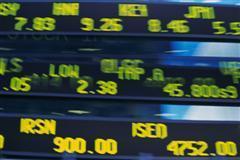| Home | About | Archives | RSS Feed |

Independent Investor: Fear and Loathing on Wall Street
 It has been over a year since investors experienced the kind of sell-off that has beset the global stock markets this week. As of Thursday, most indexes have lost 10 percent or more. The jury is split on whether we are at the bottom or have more to go.
It has been over a year since investors experienced the kind of sell-off that has beset the global stock markets this week. As of Thursday, most indexes have lost 10 percent or more. The jury is split on whether we are at the bottom or have more to go.
Most of the losses have occurred quickly, in around 8-9 days, which although painful, could be a blessing in disguise. Sharp, short corrections, in my opinion, are much better than corrections that drag on for months losing a little each day.
Of course, these large declines often trigger strong emotional reactions among investors but decisions based on panic rarely prove to be the right ones in hindsight. So I thought I would provide a little perspective on why the markets are selling off and whether or not you want to join the ranks of sellers.
Over the last few months, the macroeconomic data began to weaken. At first, economists explained that it was caused by bad weather, then the Japan earthquake, but as the numbers continued to come in at a less-than-expected rates investors grew increasingly nervous. Then last week, while all eyes were focused on the debt ceiling crisis, the Commerce Department announced that second quarter GDP came up short — 1.3 percent versus 1.7 percent expected. Even worse, the first quarter was revised downward to just 0.04 percent, a shockingly dismal performance.
That number, combined with an unemployment rate above 9 percent, plus continued uncertainty within the poorer countries of the EU, was enough to tip the scales. The trading range that the markets have been locked in since the end of April was finally resolved to the downside. Since then, we have broken several technical supports and are hovering just above a big one at 1,225 on the S&P 500 Index. If it breaks down and through this level, the chances of additional losses are quite high.
Sounds like doomsday, doesn't it? Well, the same thing happened last year for the same reasons. The economy was slowing, unemployment rising, Europe was in trouble and the markets dropped 16 percent from April 2010 through August. It was then that the Federal Reserve Bank announced the possibility of QE II. The markets reversed, exploded upward and investors never looked back.
Since March 2009 we have had seven such "dips." Each pullback was considered a buying opportunity and those investors that did so have been mightily rewarded. No one knows if this will be No. 8 or if we are going to continue lower. At some level, stock prices will become just too cheap for value buyers to remain on the sidelines. Some say we are at that level now.
My advice is to decide how much you are willing to lose and when you reach that limit sell and move to the sidelines. For some investors that can mean 5 percent (you should already be out), others will accept 10 percent, while some might be willing to sustain even more. Once your limit is reached don't hesitate. Be prepared emotionally for the possibility that the markets could turn around a day after you sell out. Accept that if it happens, and don't beat yourself up for not staying the course.
For those of you who have bond investments, keep them since bonds and gold are benefiting from the stock selloff.
Bill Schmick is an independent investor with Berkshire Money Management. (See "About" for more information.) None of the information presented in any of these articles is intended to be and should not be construed as an endorsement of BMM or a solicitation to become a client of BMM. The reader should not assume that any strategies, or specific investments discussed are employed, bought, sold or held by BMM. Direct your inquiries to Bill at (toll free) or e-mail him at wschmick@fairpoint.net . Visit www.afewdollarsmore.com for more of Bill's insights.
| Tags: selloff, corrections |
@theMarket: Time Corrections
 There are different kinds of corrections in the stock market. None of them are pleasant to endure. This particular pullback appears to be one of the least painful. It is called a time correction.
There are different kinds of corrections in the stock market. None of them are pleasant to endure. This particular pullback appears to be one of the least painful. It is called a time correction.
Most investors are familiar with what I call the "gap down," when markets drop 1-2-3 percent or more in a few days. We had a lot of those babies back in 2008-2009. Then there are the "slow bleed" sell-offs, where the markets drop a smaller amount but maintain a steady grind downward, punctuated by one or two feeble up days. So far this time correction, now in its second month, appears to be locked in a fairly tight trading range on the S&P 500, between 1,340 on the upside and 1,275 on the bottom.
A time correction can provide exactly the same outcome as its more dramatic (and debilitating) cousins. Remember why corrections occur in the first place. At a certain price level, sellers believe the risk of holding stocks is too high given the perceived investment climate. There are several reasons that the bears want to sell: Libya, higher oil prices, the simultaneous fear of both inflation and slower growth, and stocks are extended and overbought. Sellers believe that the level of the S&P 500 is an attractive price in which to take some profits.
Then there are the buyers who believe the oil price will retreat as Middle East tensions dissipate over time. These bulls see the U.S. economy growing, unemployment falling and the Fed's QE 2 continuing to provide support for the stock market. The bulls are looking for deals and are not willing to pay anymore than 1,300 or so for stocks as represented by the S& P 500 Index level.
As new developments (negative or positive) come to the forefront, the buyers or sellers will react on any given day by pushing the averages up or down. What is important here is that over time (if the news remains the same) all the sellers who wish to sell will finally do so, leaving only buyers. At the same time the overextended, overbought condition of a great many stocks will have run its course leaving them in a condition to resume an uptrend.
Could stocks break through this range either up or down?
Of course they can and often do. In bull trends, such as the one we are in right now, it usually signals a selling climax. I don’t advise holding out for some climatic sell-off in order to buy this dip but rather accumulate equities as we trade closer to 1,300 and avoid chasing stocks on the upside unless some definitive solution to the Libyan problem suddenly materializes.
I personally believe that either Gaddafi will melt away, like the Wicked Witch of the East, or flee to Venezuela to his buddy Hugo, the Wizard of Venezuela. Oil prices will decline and the markets, now refreshed by this pause, will take you and me on a rapid and exhilarating ride higher.
In the meantime, patience would be a virtue that I would cultivate during these somewhat volatile times. If that doesn't work, just stop eyeballing your portfolio every few hours and do something productive instead, like e-mailing me your investment questions.
Bill Schmick is an independent investor with Berkshire Money Management. (See "About" for more information.) None of the information presented in any of these articles is intended to be and should not be construed as an endorsement of BMM or a solicitation to become a client of BMM. The reader should not assume that any strategies, or specific investments discussed are employed, bought, sold or held by BMM. Direct your inquiries to Bill at 1-888-232-6072 (toll free) or e-mail him at wschmick@fairpoint.net. Visit www.afewdollarsmore.com for more of Bill's insights.
| Tags: corrections, bears |
@theMarket: The Correction, At Last
 At long last, we are having a pullback in global financial markets. Most investors would agree that it is long overdue. But now that we are in the midst of it, the bears are out in full force. Ignore them.
At long last, we are having a pullback in global financial markets. Most investors would agree that it is long overdue. But now that we are in the midst of it, the bears are out in full force. Ignore them.
"Libya Rebels Tighten Noose" read Friday's headlines in the Wall Street Journal. The national media is devoting huge blocks of time and resources to cover unfolding developments in a country that supplies less than 2 percent of the world's oil. And yet both retail investors and seasoned professionals have been dumping stocks in panic this week. Who says markets are efficient? Honestly, these events may provide the drama and justification for the sell-off, but for me I care only for the outcome.
Yesterday oil hit $103 a barrel. For over a year, my interim price target on oil has been $100 a barrel. I promptly advised readers to take profits (see "Oil hits my price target"). If you missed it, you can read the entire story on my blog at www.afewdollarsmore.com.
The reasoning behind this sale is threefold: 1) contrary to the talking heads on television, I do not believe that these Middle Eastern rebellions will jeopardize global oil supplies and 2) I also expect that Saudi Arabia can and will easily make up any shortfall due to Libya's suspension of oil exports. Right now that shortfall is roughly 700,000 barrels a day.
Finally, U.S. economic growth is moderate at best. On Friday, for example, GDP for the fourth quarter of 2010 was revised down to 2.8 percent following a 2.6 percent rate in last year's third quarter. Those are less than half the growth rate the U.S. normally experiences in prior recoveries. Those numbers do not justify oil prices at existing levels. Today, oil is trading around $97 a barrel. I expect that we will trade in a $5 to $6 a barrel range until there is some resolution in Libya, and then prices should fall back.
Many investors were also surprised at the U.S. dollar's behavior during this latest crisis. The dollar has historically been perceived as a "safe" investment when other securities are not. In the past, its value has risen in uncertain times — but not this time.
Instead, gold and silver spiked higher as investors worldwide preferred precious metals rather than the dollar as a place to hide until this crisis passes. Gold and silver still have room to run and neither has reached my price target.
Some market analysts argue that because this crisis is about oil, and not financials, the dollar provided little security since higher oil prices would clobber our economy. Economists claim that $100-a-barrel oil will knock a full percentage point off U.S. GDP. They point out that the currencies of Canada, Switzerland and Norway did move higher, however. Two out of these three countries are oil exporters and all are more energy efficient and have higher interest rates than the U.S.
I'm not sure I buy that explanation in its entirety. I have written before that we are in a transition period in which the U.S. dollar is losing its preemptive place among the world's currencies. In my opinion, it may still lay claim to being "first among equals" but over time the dollar will join with a basket of other currencies in providing a new global foreign exchange benchmark. This may simply be another sign that investor's behavior is changing.
As for this pull back, we have already dropped 3 percent or so on the S&P 500 Index. My forecast was for a 3 to 5 percent decline, so maybe we have seen the worst of it, or we might still have a few more days next week before it is over. Either way, buy the dip.
Bill Schmick is an independent investor with Berkshire Money Management. (See "About" for more information.) None of the information presented in any of these articles is intended to be and should not be construed as an endorsement of BMM or a solicitation to become a client of BMM. The reader should not assume that any strategies, or specific investments discussed are employed, bought, sold or held by BMM. Direct your inquiries to Bill at 1-888-232-6072 (toll free) or e-mail him at wschmick@fairpoint.net. Visit www.afewdollarsmore.com for more of Bill's insights.
This article was supposed to run Saturday morning but was accidently scheduled for a later posting date. We apologize for any inconvenience.
| Tags: bears, oil, corrections |
@theMarket: Corrections Are Good for the Soul
 It was long overdue. For weeks, the stock market has registered overbought conditions and still it forged ahead. Investors had driven the averages back to yearly highs and only then did the rally run out of steam. Now it's time to step aside and watch.
It was long overdue. For weeks, the stock market has registered overbought conditions and still it forged ahead. Investors had driven the averages back to yearly highs and only then did the rally run out of steam. Now it's time to step aside and watch.
"Is this the start of something big or should I just stay put?" asked a retired client from Pittsfield who has recouped much of his 2008 loses over the last year.
"Stay put," I said, "because this pullback will be short and unless you are a day trader, too volatile to do more than add to existing positions."
I'm thinking we could see the stock markets drop as much as 5 percent, which from here isn't such a big deal. Take the S&P 500 Index, for example. This week it hit an intraday high of 1,227 (almost 10 points higher than its peak in April). A 5 percent decline from that level would put the average at 1,165, a mere 30 points down from here. That's not worth getting excited about.
As a rule of thumb, I believe that 5 percent to 10 percent corrections in the stock market are the "price of doing business" or the risk one must accept in equity investing. These kinds of corrections occur 2-3 times a year on average. And it is not just equities that are falling.
Commodities are also declining. As I look at the present spot price of gold, the precious metal is off over $40 an ounce while silver is down $1.50 an ounce and oil has plummeted over $3 a barrel — in just one day. Commodities tend to have extremely sharp, if short, corrections that tend to wilt most amateur investors' resolve to stay invested. It appears that once again those who have chased energy, precious metals and agricultural commodities are suffering big reversals this week. Rather than buy this weakness, they tend to sell in panic.
For those with bullish convictions, this pullback is a buying opportunity, not only in commodities but stocks in general. This coming week should provide further opportunities to establish new positions. Some of the areas I favor for additional investment are emerging markets, real estate such as REITs, commodities, commodity companies and selected technology.
As for the culprits that triggered the pullback, most of the negative events have something to do with governments. The on-again-off-again saga of the European debt crisis has reignited fresh worries over Ireland's struggle to rescue its financial system. It has led investors to re-examine Europe's financial situation in general.
At the same time, China is rumored to be hiking interest rates in an attempt to slow their economy. That would spell bad news for everyone since China has become the new locomotive of global growth. Over in Korea, where the G20 adjourned without agreeing on how to curb the growing currency war, left investors worried and disappointed over the fate of the U.S. dollar.
All of the above are serious issues but they have been with us throughout the year. China has raised rates before and emerging market growth is still quite healthy. The problems of Europe's smaller economies will continue to plague the Euro and the European Community for the next few years, but has not stopped their stock markets from enjoying substantial gains over the last six months.
The financial world is fully aware of every nuance of the currency debate. The dollar has declined since late August, sending stocks and commodities ever upward. None of this is new. Consider this pullback a healthy correction and that's all you need to know.
All these reasons for the sell-off will still be with us a month from now when the averages have regained their upward ascent, so don't put too much stock in today's headlines. They are fleeting at best. Focus instead on the opportunities this sell-off will present.
Bill Schmick is an independent investor with Berkshire Money Management. (See "About" for more information.) None of the information presented in any of these articles is intended to be and should not be construed as an endorsement of BMM or a solicitation to become a client of BMM. The reader should not assume that any strategies, or specific investments discussed are employed, bought, sold or held by BMM. Direct your inquiries to Bill at 1-888-232-6072 (toll free) or e-mail him at wschmick@fairpoint.net. Visit www.afewdollarsmore.com for more of Bill's insights.
| Tags: corrections, stocks, metals, China, commodities |
|

